Clear Skies And A Chance Of Joy
For Laura Lavigne, life holds the magic of a treasure hunt. A keeper of small moments, a spreader of joy, a mother, a dreamer, a doer, not to mention a French baker, Laura is a bright splash of color on any canvas. And she’s walked down quite a multifaceted road along the way.
In this Awakin Call conversation with Afreen, she shares stories and lessons from her experiences working as a make-up artist to turning down corporate sponsorship, tossing out her well-rehearsed TEDx speech for spontaneity’s sake, and, time and time again, meeting strangers from the heart.
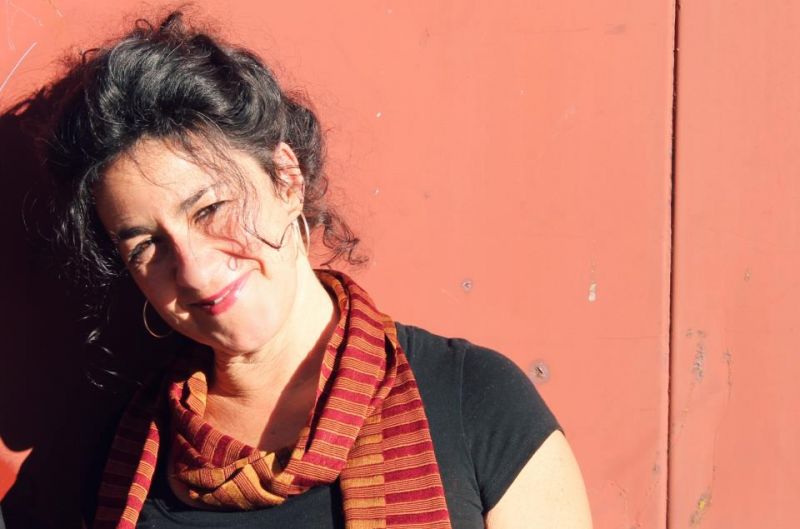
Afreen: What drives you?
Laura: I think it started when I was really little. I remember telling my parents—I grew up in Paris, France, and my parents were really successful people. I remember telling them when I was really young that I wanted to be a social worker. And that was met with condescension and laughter, like that was a silly idea.
So, life moved on and I moved to the states. I engaged in a career as a make-up artist for movies. I remember the best joy I had in my work was when I would sit down one-on-one with an actor or model and really connect with them. And have a heart-connection.
There came a time when my career grew and I was on the set with some movie stars, and I was holding a brush. I remember thinking:
The most I’m going to contribute today is I’m going to powder someone’s nose.
It just felt like a slow death. I needed to do more than this—it was not enough.
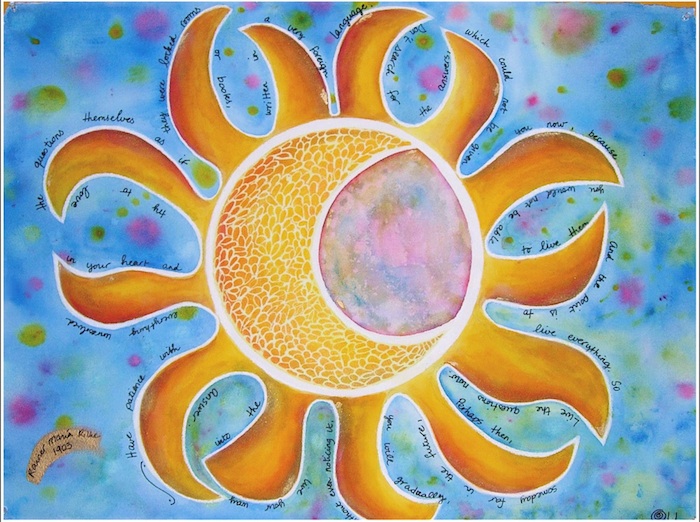
So life went on. I started a French bakery. And then again, what fed me was feeding people and doing small acts within running the bakery. It wasn’t the big running of the bakery that did it for me.
That ended. And I heard about life coaching, which I had never heard about before. And I thought, This is it. This is what I want to do. Sort of going back to the social worker that I wanted to be at 7 years old, just wanting to make life easier for people.
So that’s what drives my days and the way I raise my kids. I just believe there’s a mathematical equation there that’s pretty magical. Giving very little—somewhere in the conversion—becomes very big when you receive it. So I’m very fascinated with that.
Then, in 2011, I was craving connection and community in a really deep way. My kids were growing up, and I could see that I needed more connection in my life. So I decided to create a community center here. I live on an island in Anacortes, Washington. And I thought it would be a good idea to call it the Anacortes Wellness Center. It sounded pretty grown-up. So I started to call it that.
But, someone who knows me really well said, “Well, a wellness center doesn’t sound really authentic. If you could start any center, what would it be?”
I said, “Well, I’d start a Center for Happiness, but that doesn’t really exist.”
And as I said it, I knew it. That’s totally what I’m starting.
So I started the Anacortes Center for Happiness. And it got really lit up. And felt really authentic and really where I needed to be in the idea of spreading joy while experiencing joy. And doing goofy things. And doing things that just make people laugh or feel warm or even just comforted—it’s not always about laughing. Just that sweetness of connection.
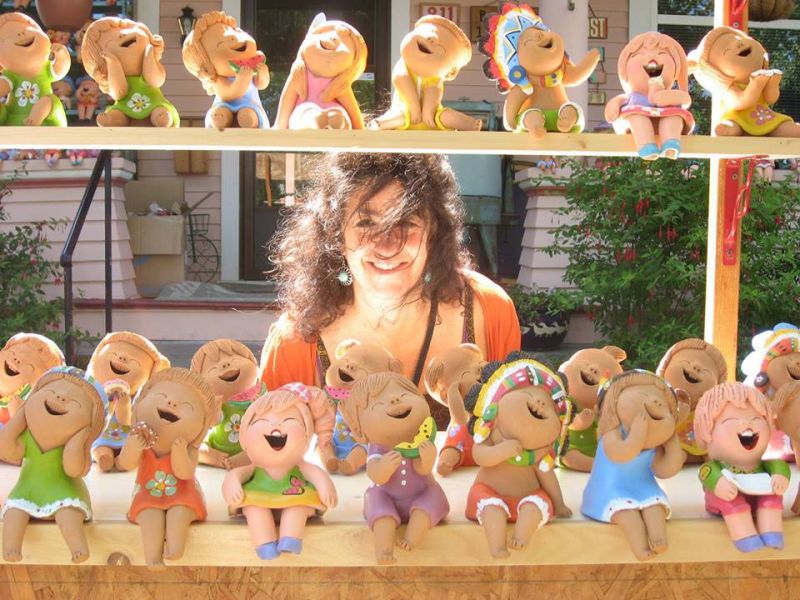
AM: Wow, absolutely. I love your childhood dream of being a social worker—you are a social worker today, in a sense. With all the joy and just the work of pulling together society.
LL: Well, you know, there’s this authentic part of us, and we can get it squashed down. But it’s going to pop out. It’s going to ooze out somewhere, even if we’re much older. It’s going to come out.
AM: Can you say more about that? How does that authenticity rise up?
LL: I think it has a lot to do with surrounding yourself with people and an environment that allow for who you are to shine. And for us to do that for others as well.
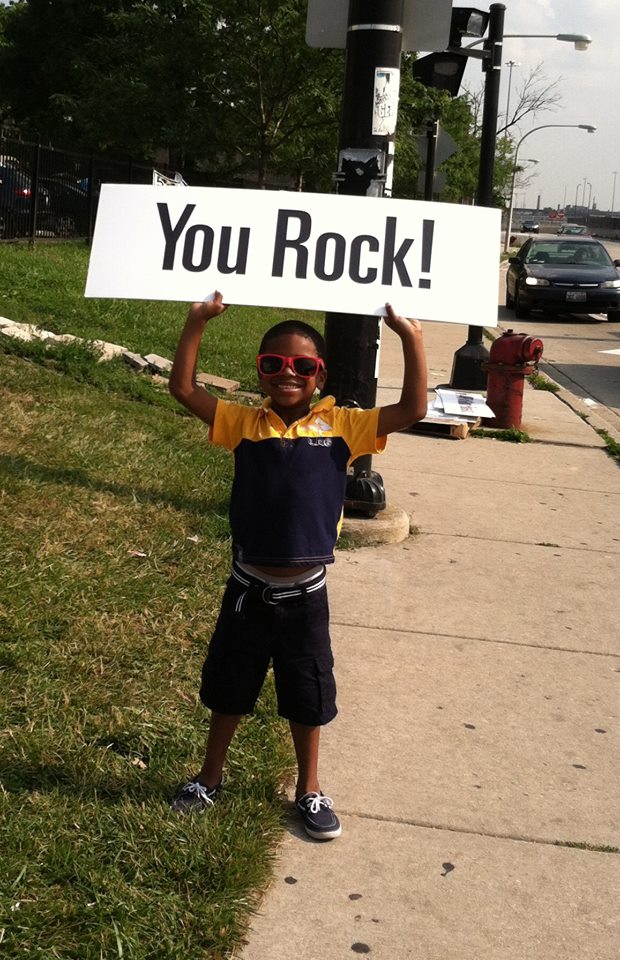 If we’re scared that, by being who we are, we’re going to get ostracized from the tribe—then we won’t be who we are. Because being part of the tribe—whatever tribe it is—is going to be more important. And that’s almost like survival.
If we’re scared that, by being who we are, we’re going to get ostracized from the tribe—then we won’t be who we are. Because being part of the tribe—whatever tribe it is—is going to be more important. And that’s almost like survival.
But if our tribe becomes this warm, supportive environment, then little by little, we become much more safe in seeing who we are. So we get make that choice—we get to decide who the majority of the people we spend our time with are.
That’s one way. And in my work as a life coach, to me, authenticity is always a priority. Because I believe that we all have something so magnificent to share, that if we choose something else—something maybe more palatable, or more conventional—we’re going to be cheating everybody.
AM: With the stories you hear from people, from their experiences with these small acts of joy, can you share a story with us?
LL: Yes, at our first Happiness Sprinkling, we ended up on the street corner holding the signs, had a blast, and then I put the signs away. I didn’t think anything more was going to happen. That was in May 2012.
And the summer came and went. In September, I was invited to do a little event in Seattle with a friend. It was called, “Parking Day” and you take over a parking spot and do whatever you want. As I was leaving for it, I thought, Let me grab some of those signs we made. I’ll grab four or five, and we’ll decorate our parking space with it.
As we were wrapping up at Parking Day, I asked the folks there, “Hey, does anybody want to stand on the street corner with the signs with me?”
It was rush hour in Seattle. There were five signs. Five of us. It was unbelievable. People were honking and waving. And then this woman came towards me and asked if she could hold one of the signs.
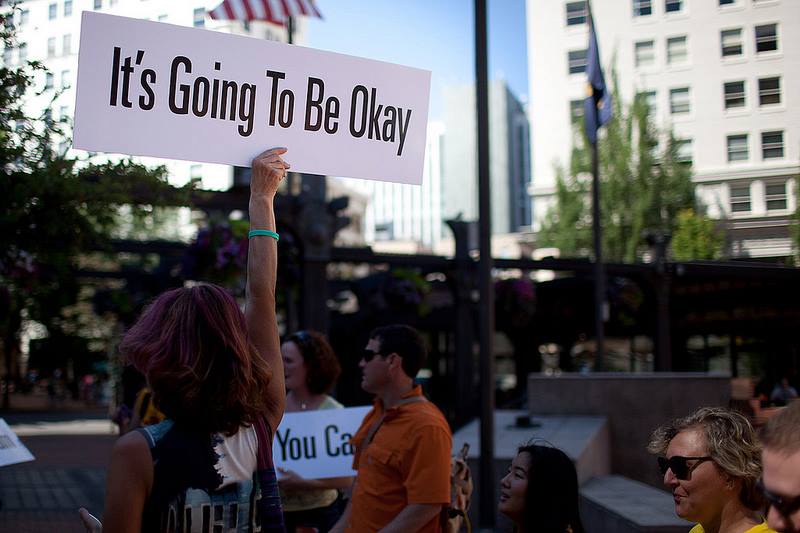
It was the sign that said, “It’s going to be all right.”
She held that sign straight up in front of her. After a few minutes, I turned around to check on her to see how she was doing. She had tears running down her face. My guess was that it was speaking to her as much as it was speaking to everybody—there was just something there.
The energy was so strong, This man walked by and he was waiting for the light to change. He was headed for the gym and said he would hold the sign while the light changed. And he stayed with us for an hour.
He said, “There’s no way I’m going anywhere else. This is the best thing that’s happened to me.”
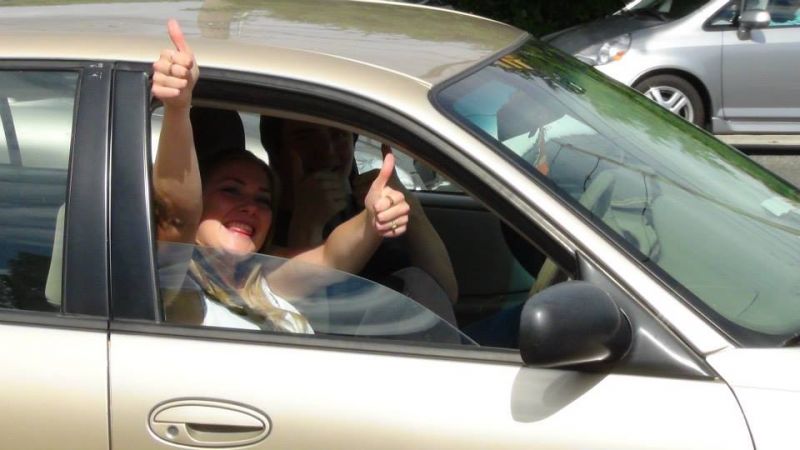
So then I packed the signs and went home and the next day, I was thinking—it wasn’t even thinking. It just birthed out of me, like there’s no way I’m going to hold this thing back. It’s just asking to grow.
Within a day, I had a website. And I had the domain, and I had figured out how we were going to do it and pass it person to person. That lady, holding the sign and crying, was so impactful to me.
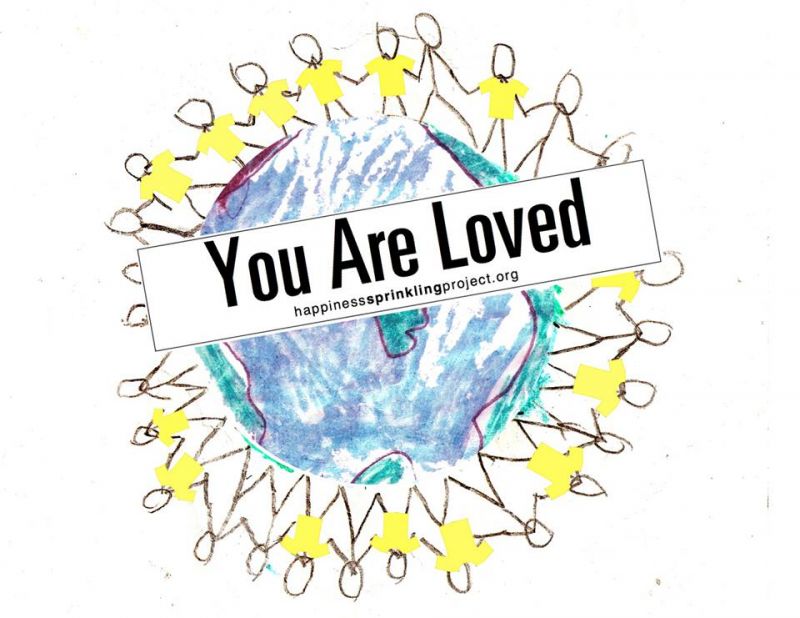 And words—if you think about words, like if you go about your day this afternoon, and you look at what the written word is throughout your day, you will find words that are informational. You will find words that are to sell you things or to possibly scare you. Very rarely will your eyes rest on words that have other agenda than to support you. It just does not happen very often. And I think that’s the power of these events.
And words—if you think about words, like if you go about your day this afternoon, and you look at what the written word is throughout your day, you will find words that are informational. You will find words that are to sell you things or to possibly scare you. Very rarely will your eyes rest on words that have other agenda than to support you. It just does not happen very often. And I think that’s the power of these events.
AM: It’s really beautiful how sometimes the very healing for ourselves might be what we’re providing others at the same time.
LL: Because we’re all one. Whether I hold the sign or you read the sign, it doesn’t make any difference.
AM: It’s interesting, too, how it’s come to be in our society that if there’s a bunch of people holding signs in a public space, it must be a protest or something. And just to shift that paradigm a little and say, “No, it’s just simple messages of human compassion”—that’s such a beautiful effort.
LL: We were contacted by an organization that wanted to join in with us. They wanted to do some sort of corporate sponsorship that would make us more visible. And, as appealing as the thought is to have some means to further the project, it’s just not something that would ever work. Because the second you take the neutrality away, then something is between the messages and the people. And that’s always—that’s why we do what we do. It has to be a straight line from our words to their hearts. And the second there’s some agenda to that, it just doesn’t work.
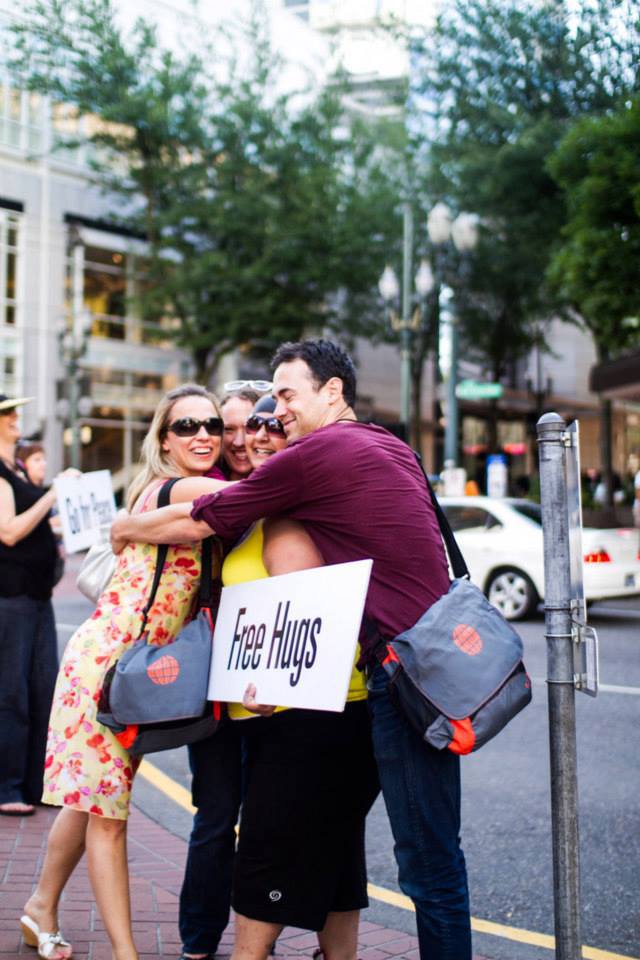
AM: And like you said, it’s really hard to measure every corner that the ripples go into, but you trust that they happen. What does that feel like to connect across state and country boundaries with strangers on this topic?
LL: It feels amazing and a little bit scary, if I’m going to be honest here. There’s just a tiny bit of responsibility and I can’t quite explain why that is. A little bit of “How did I do that?” and “Is that okay?”
But most of it is just joy and wanting to do it more and more and more. I’m constantly blown away!
This one lady missed her train and got off at the wrong spot, which was actually the right spot. She saw our signs and was walking with her daughter who said, “Don’t make eye contact, Mom. These people are not well. Don’t make eye contact!”
And she just came up to us and started talking to us and said, “Oh my gosh! I found my people.” Within a month, she hosted her own sprinkling and became a part our 90-Day Gratitude Challenge group.
Audrey: I was struck by the daughter’s comment, “Mom, these people are not well. Don’t make eye contact.” When you’re out there, holding those signs, there’s a real joy to it. But that joy can often seem a little fluffy to someone who might be in a different space. How do you reach someone who might be coming from a place of scarcity or a place where this kind of stuff just doesn’t translate?
LL: Well, I don’t. Because that’s where their path is. We had a man come to us. And we had the “Free Hugs” sign. And he came by and said, “I don’t hug anybody. I don’t even hug my kids.”
It’s not my job to convince people. Because then I would be doing the same thing all these other words are doing. So I feel really clear that my job—our job—is to offer. But definitely not push. Just being who we are and trust that whoever is meant to receive this, will. And maybe it’s just a seed that will come out, and it’ll start growing next month or next year. It’s really important to me to offer, but no more than that.
Because people are where they are. And by you being who you are—you give them an opportunity to help themselves to your joy, if that’s what’s right for them right now. But you can’t—it’s like people who spank their kids for having pushed someone on the playground. You can’t bully or pressure someone into being happy. You can just be the joy, and if it matches, then it’s wonderful. And if it doesn’t, then it’s just not the right time.
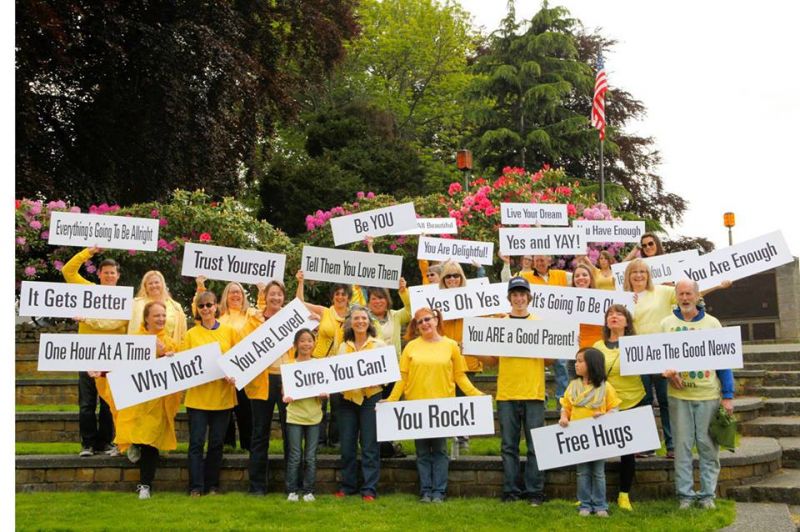
Prakash: How do you find clarity to act?
LL: I think that has to do with the way I’m wired. Something comes through me, and I can’t not do it. It’s like, if you have an itch, you’re going to scratch it. When it’s coming through me, I just have to do it.
For instance, the gratitude challenge came up at 11pm and I couldn’t sleep. There’s a creative force that just breathes through me, and I just have to make it exist in the real world. And then, sometimes I goof up. I wrote a couple of books—there are a few typos in them. But, they’re out there. So, I don’t go for perfect.
A really dear friend of mine tells me that often. She says, “Listen, we’re not the Center for Perfection. We’re the Center for Happiness.”
So I don’t go for perfect. I go for delivering. And if I think something is worth delivering, I can work at it until its delivered.
Audrey: As I’m listening to the conversation, it just seems like you have such an eye for catching all those little moments.
LL: Yeah, there’s so much richness everywhere. There’s so many signs—to me, it feels like life is a little bit of a treasure hunt and a game, and there’s always the clue to the next place where you’re supposed to go. And to lead from joy, I think is just so, so, so important.
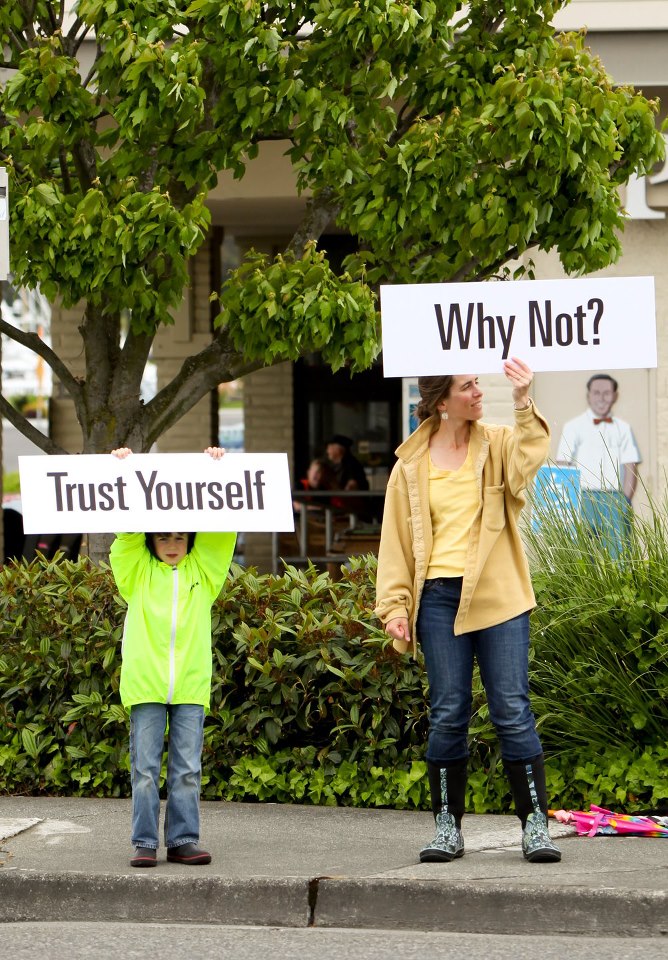 I sometimes tell myself that I need to be more grown-up, and a little bit more conventional. A month ago, I was invited to speak at TEDx, and on the same day of the event, some of my friends had agreed to organize a sprinkling close to where the event was going. So they did the sprinkling, and when I was getting ready—I was to close the TEDx conference, so right before, at our last break—I went outside to get some fresh air. And I was very focused, I had been rehearsing my talk for weeks. And I walked outside—oh my gosh! These guys arrived.
I sometimes tell myself that I need to be more grown-up, and a little bit more conventional. A month ago, I was invited to speak at TEDx, and on the same day of the event, some of my friends had agreed to organize a sprinkling close to where the event was going. So they did the sprinkling, and when I was getting ready—I was to close the TEDx conference, so right before, at our last break—I went outside to get some fresh air. And I was very focused, I had been rehearsing my talk for weeks. And I walked outside—oh my gosh! These guys arrived.
They were post-sprinkling happiness high. They had boas on, were laughing, and just so full of joy. We took pictures, and by the time I walked back into the conference, my concentration was completely gone. All I could feel was the joy of the sprinkling, even though I hadn’t done one.
And I thought, Oh my gosh, I don’t know what I’m going to do.
They called me on stage, and I walked on. Instead of being grown-up and focused, I was just giddy. Because I was just with them with their post-sprinkling joy.
And it was perfect. The name of my talk was “Go for Joy,” and the universe delivered to me the perfect way to do that. I walked on stage filled with joy instead of filled with concentration.
Coming from joy is just a really, fairly sure way that you’re going to share more of that. And practicing, analyzing, and all that—it’s important. But I don’t think it’s as important as coming from joy.
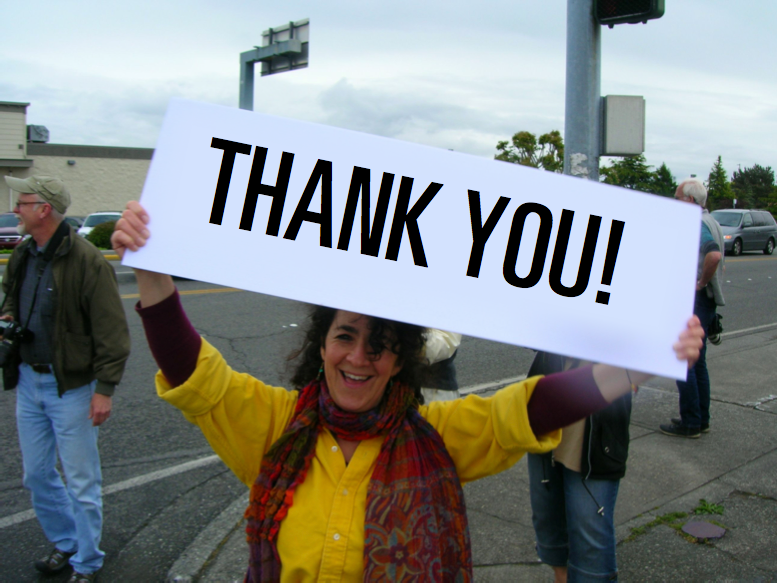
Laura Lavigne continues to sprinkle happiness around the world. In addition to running the Anacortes Center for Happiness, she serves as a life coach, speaker, artist, and author of two books, Pink Hair & Chocolate Cookies and Petites Histoires. More insights in her own words can be found her website and blog. - See more at:
In this Awakin Call conversation with Afreen, she shares stories and lessons from her experiences working as a make-up artist to turning down corporate sponsorship, tossing out her well-rehearsed TEDx speech for spontaneity’s sake, and, time and time again, meeting strangers from the heart.

Afreen: What drives you?
Laura: I think it started when I was really little. I remember telling my parents—I grew up in Paris, France, and my parents were really successful people. I remember telling them when I was really young that I wanted to be a social worker. And that was met with condescension and laughter, like that was a silly idea.
So, life moved on and I moved to the states. I engaged in a career as a make-up artist for movies. I remember the best joy I had in my work was when I would sit down one-on-one with an actor or model and really connect with them. And have a heart-connection.
There came a time when my career grew and I was on the set with some movie stars, and I was holding a brush. I remember thinking:
The most I’m going to contribute today is I’m going to powder someone’s nose.
It just felt like a slow death. I needed to do more than this—it was not enough.

So life went on. I started a French bakery. And then again, what fed me was feeding people and doing small acts within running the bakery. It wasn’t the big running of the bakery that did it for me.
That ended. And I heard about life coaching, which I had never heard about before. And I thought, This is it. This is what I want to do. Sort of going back to the social worker that I wanted to be at 7 years old, just wanting to make life easier for people.
So that’s what drives my days and the way I raise my kids. I just believe there’s a mathematical equation there that’s pretty magical. Giving very little—somewhere in the conversion—becomes very big when you receive it. So I’m very fascinated with that.
Then, in 2011, I was craving connection and community in a really deep way. My kids were growing up, and I could see that I needed more connection in my life. So I decided to create a community center here. I live on an island in Anacortes, Washington. And I thought it would be a good idea to call it the Anacortes Wellness Center. It sounded pretty grown-up. So I started to call it that.
But, someone who knows me really well said, “Well, a wellness center doesn’t sound really authentic. If you could start any center, what would it be?”
I said, “Well, I’d start a Center for Happiness, but that doesn’t really exist.”
And as I said it, I knew it. That’s totally what I’m starting.
So I started the Anacortes Center for Happiness. And it got really lit up. And felt really authentic and really where I needed to be in the idea of spreading joy while experiencing joy. And doing goofy things. And doing things that just make people laugh or feel warm or even just comforted—it’s not always about laughing. Just that sweetness of connection.

AM: Wow, absolutely. I love your childhood dream of being a social worker—you are a social worker today, in a sense. With all the joy and just the work of pulling together society.
LL: Well, you know, there’s this authentic part of us, and we can get it squashed down. But it’s going to pop out. It’s going to ooze out somewhere, even if we’re much older. It’s going to come out.
AM: Can you say more about that? How does that authenticity rise up?
LL: I think it has a lot to do with surrounding yourself with people and an environment that allow for who you are to shine. And for us to do that for others as well.
 If we’re scared that, by being who we are, we’re going to get ostracized from the tribe—then we won’t be who we are. Because being part of the tribe—whatever tribe it is—is going to be more important. And that’s almost like survival.
If we’re scared that, by being who we are, we’re going to get ostracized from the tribe—then we won’t be who we are. Because being part of the tribe—whatever tribe it is—is going to be more important. And that’s almost like survival.But if our tribe becomes this warm, supportive environment, then little by little, we become much more safe in seeing who we are. So we get make that choice—we get to decide who the majority of the people we spend our time with are.
That’s one way. And in my work as a life coach, to me, authenticity is always a priority. Because I believe that we all have something so magnificent to share, that if we choose something else—something maybe more palatable, or more conventional—we’re going to be cheating everybody.
AM: With the stories you hear from people, from their experiences with these small acts of joy, can you share a story with us?
LL: Yes, at our first Happiness Sprinkling, we ended up on the street corner holding the signs, had a blast, and then I put the signs away. I didn’t think anything more was going to happen. That was in May 2012.
And the summer came and went. In September, I was invited to do a little event in Seattle with a friend. It was called, “Parking Day” and you take over a parking spot and do whatever you want. As I was leaving for it, I thought, Let me grab some of those signs we made. I’ll grab four or five, and we’ll decorate our parking space with it.
As we were wrapping up at Parking Day, I asked the folks there, “Hey, does anybody want to stand on the street corner with the signs with me?”
It was rush hour in Seattle. There were five signs. Five of us. It was unbelievable. People were honking and waving. And then this woman came towards me and asked if she could hold one of the signs.

It was the sign that said, “It’s going to be all right.”
She held that sign straight up in front of her. After a few minutes, I turned around to check on her to see how she was doing. She had tears running down her face. My guess was that it was speaking to her as much as it was speaking to everybody—there was just something there.
The energy was so strong, This man walked by and he was waiting for the light to change. He was headed for the gym and said he would hold the sign while the light changed. And he stayed with us for an hour.
He said, “There’s no way I’m going anywhere else. This is the best thing that’s happened to me.”

So then I packed the signs and went home and the next day, I was thinking—it wasn’t even thinking. It just birthed out of me, like there’s no way I’m going to hold this thing back. It’s just asking to grow.
Within a day, I had a website. And I had the domain, and I had figured out how we were going to do it and pass it person to person. That lady, holding the sign and crying, was so impactful to me.
 And words—if you think about words, like if you go about your day this afternoon, and you look at what the written word is throughout your day, you will find words that are informational. You will find words that are to sell you things or to possibly scare you. Very rarely will your eyes rest on words that have other agenda than to support you. It just does not happen very often. And I think that’s the power of these events.
And words—if you think about words, like if you go about your day this afternoon, and you look at what the written word is throughout your day, you will find words that are informational. You will find words that are to sell you things or to possibly scare you. Very rarely will your eyes rest on words that have other agenda than to support you. It just does not happen very often. And I think that’s the power of these events.AM: It’s really beautiful how sometimes the very healing for ourselves might be what we’re providing others at the same time.
LL: Because we’re all one. Whether I hold the sign or you read the sign, it doesn’t make any difference.
AM: It’s interesting, too, how it’s come to be in our society that if there’s a bunch of people holding signs in a public space, it must be a protest or something. And just to shift that paradigm a little and say, “No, it’s just simple messages of human compassion”—that’s such a beautiful effort.
LL: We were contacted by an organization that wanted to join in with us. They wanted to do some sort of corporate sponsorship that would make us more visible. And, as appealing as the thought is to have some means to further the project, it’s just not something that would ever work. Because the second you take the neutrality away, then something is between the messages and the people. And that’s always—that’s why we do what we do. It has to be a straight line from our words to their hearts. And the second there’s some agenda to that, it just doesn’t work.

AM: And like you said, it’s really hard to measure every corner that the ripples go into, but you trust that they happen. What does that feel like to connect across state and country boundaries with strangers on this topic?
LL: It feels amazing and a little bit scary, if I’m going to be honest here. There’s just a tiny bit of responsibility and I can’t quite explain why that is. A little bit of “How did I do that?” and “Is that okay?”
But most of it is just joy and wanting to do it more and more and more. I’m constantly blown away!
This one lady missed her train and got off at the wrong spot, which was actually the right spot. She saw our signs and was walking with her daughter who said, “Don’t make eye contact, Mom. These people are not well. Don’t make eye contact!”
And she just came up to us and started talking to us and said, “Oh my gosh! I found my people.” Within a month, she hosted her own sprinkling and became a part our 90-Day Gratitude Challenge group.
Audrey: I was struck by the daughter’s comment, “Mom, these people are not well. Don’t make eye contact.” When you’re out there, holding those signs, there’s a real joy to it. But that joy can often seem a little fluffy to someone who might be in a different space. How do you reach someone who might be coming from a place of scarcity or a place where this kind of stuff just doesn’t translate?
LL: Well, I don’t. Because that’s where their path is. We had a man come to us. And we had the “Free Hugs” sign. And he came by and said, “I don’t hug anybody. I don’t even hug my kids.”
It’s not my job to convince people. Because then I would be doing the same thing all these other words are doing. So I feel really clear that my job—our job—is to offer. But definitely not push. Just being who we are and trust that whoever is meant to receive this, will. And maybe it’s just a seed that will come out, and it’ll start growing next month or next year. It’s really important to me to offer, but no more than that.
Because people are where they are. And by you being who you are—you give them an opportunity to help themselves to your joy, if that’s what’s right for them right now. But you can’t—it’s like people who spank their kids for having pushed someone on the playground. You can’t bully or pressure someone into being happy. You can just be the joy, and if it matches, then it’s wonderful. And if it doesn’t, then it’s just not the right time.

Prakash: How do you find clarity to act?
LL: I think that has to do with the way I’m wired. Something comes through me, and I can’t not do it. It’s like, if you have an itch, you’re going to scratch it. When it’s coming through me, I just have to do it.
For instance, the gratitude challenge came up at 11pm and I couldn’t sleep. There’s a creative force that just breathes through me, and I just have to make it exist in the real world. And then, sometimes I goof up. I wrote a couple of books—there are a few typos in them. But, they’re out there. So, I don’t go for perfect.
A really dear friend of mine tells me that often. She says, “Listen, we’re not the Center for Perfection. We’re the Center for Happiness.”
So I don’t go for perfect. I go for delivering. And if I think something is worth delivering, I can work at it until its delivered.
Audrey: As I’m listening to the conversation, it just seems like you have such an eye for catching all those little moments.
LL: Yeah, there’s so much richness everywhere. There’s so many signs—to me, it feels like life is a little bit of a treasure hunt and a game, and there’s always the clue to the next place where you’re supposed to go. And to lead from joy, I think is just so, so, so important.
 I sometimes tell myself that I need to be more grown-up, and a little bit more conventional. A month ago, I was invited to speak at TEDx, and on the same day of the event, some of my friends had agreed to organize a sprinkling close to where the event was going. So they did the sprinkling, and when I was getting ready—I was to close the TEDx conference, so right before, at our last break—I went outside to get some fresh air. And I was very focused, I had been rehearsing my talk for weeks. And I walked outside—oh my gosh! These guys arrived.
I sometimes tell myself that I need to be more grown-up, and a little bit more conventional. A month ago, I was invited to speak at TEDx, and on the same day of the event, some of my friends had agreed to organize a sprinkling close to where the event was going. So they did the sprinkling, and when I was getting ready—I was to close the TEDx conference, so right before, at our last break—I went outside to get some fresh air. And I was very focused, I had been rehearsing my talk for weeks. And I walked outside—oh my gosh! These guys arrived.They were post-sprinkling happiness high. They had boas on, were laughing, and just so full of joy. We took pictures, and by the time I walked back into the conference, my concentration was completely gone. All I could feel was the joy of the sprinkling, even though I hadn’t done one.
And I thought, Oh my gosh, I don’t know what I’m going to do.
They called me on stage, and I walked on. Instead of being grown-up and focused, I was just giddy. Because I was just with them with their post-sprinkling joy.
And it was perfect. The name of my talk was “Go for Joy,” and the universe delivered to me the perfect way to do that. I walked on stage filled with joy instead of filled with concentration.
Coming from joy is just a really, fairly sure way that you’re going to share more of that. And practicing, analyzing, and all that—it’s important. But I don’t think it’s as important as coming from joy.

Laura Lavigne continues to sprinkle happiness around the world. In addition to running the Anacortes Center for Happiness, she serves as a life coach, speaker, artist, and author of two books, Pink Hair & Chocolate Cookies and Petites Histoires. More insights in her own words can be found her website and blog. - See more at:
This conversation is from a recent Awakin call, a weekly global teleconference hosted by ServiceSpace that highlights diverse journeys in service.
SHARE YOUR REFLECTION
3 Past Reflections


On Jan 11, 2014 Sherry wrote:
This is me - no wonder some people have trouble understanding me! This is not a societal norm,we are always supposed to be closed and functioning, not spontaneous!

On Jan 11, 2014 Bridget wrote:
wow!! I love this attitude, this giver of joy. I'm inspired to be the same in my own life - thank you Laura!
2 replies: Mama, Trixie | Post Your Reply

On Jan 15, 2014 Kristin Pedemonti wrote:
Oh Laura, You are one of My Tribe too! I've carried around a Free Hugs sign since November 2008 when I experienced it for the first time in NYC. Now I carry my sign EVERYWHERE I go and have offered & organized Free Hugs all over the world. I also carry little bottles of bubbles, amazing how that tiny bubble can completely change a space! I'll by organizing my 3rd Annual World Wide Free Hugs and would Love if you Center would host one too. Here's the facebook link: https://www.facebook.com/ev... HUG!!!! <3 Kristin
Post Your Reply